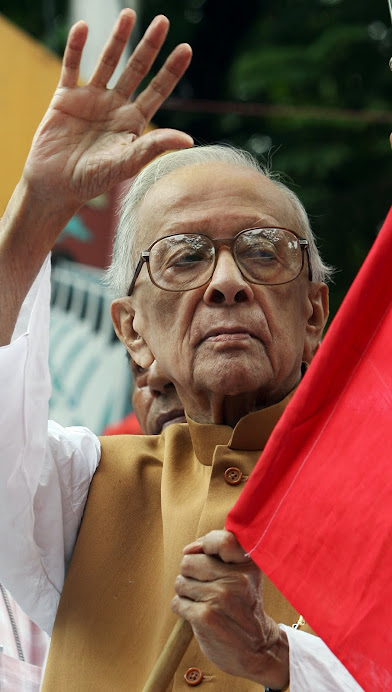Asia
Thailand's `class war': Hundreds of thousands take to the streets to demand democracy
Bangkok, March 14, 2010
By Giles Ji Ungpakorn
March 15, 2010 -- Hundreds of thousands of Thai Red Shirt pro-democracy demonstrators took to the streets of Bangkok and other cities over the weekend of March 13-14. This was a show of force to prove the strength of the movement and to dispel any lies by the royalist government and the media that the Red Shirts are not representative of the majority.
Greetings from the people's revolution in Nepal
Photos by Jed Brandt
On May 28, 2008, an elected constituent assembly declared Nepal’s centuries-old semi-feudal monarchy finished. As Nepalese people celebrated in the streets, the Himalayan country was declared a republic.
Timor Leste: `Foreign soldiers should stay out of Timorese politics'
By La’o Hamutuk
March 11, 2010 -- La’o Hamutuk calls on the military and civilian commanders of Australian and other foreign soldiers in Timor-Leste to direct their soldiers to avoid involvement in local politics, including asking Timorese citizens their political views or encouraging them to identify with one political grouping or another.
We recently received the attached letter (also below) from Mr. Mateus Fernandes Sequeira, Chefe do Suco of Lore I (Lautem District), which describes Australian and New Zealand military observers inviting local residents to a community meeting on February 23. After arriving by helicopter, the soldiers asked the residents to raise their hands if they like the AMP [Alliance of the Parliamentary Majority coalition] government better than the previous one. In addition to this being none of Australia’s business, coercing people to publicly express their political leanings in this newly sovereign nation is dangerous and destructive. It can lead to violence or retaliation, undercutting the “stabilisation” that the International Stabilisation Force (ISF) is ostensibly here to secure.
China, capitalist accumulation and the world crisis

By Martin Hart-Landsberg
[A version of this article appeared in the South Korean journal, Marxism 21. It has been posted at Links International Journal of Socialist Renewal with Martin Hart-Landsberg’s permission.]
February 2010 -- The consensus among economists is that China’s post-1978 market reform policies have produced one of the world’s greatest economic success stories. Some believe that China is now capable of serving as an anchor for a new (non-US dominated) global economy. A few claim that the reform experience demonstrates the workability (and desirability) of market socialism. This paper is critical of these views.
Indonesia: People's Democratic Party relaunched as `open, mass-based cadre party'

Pakistan: Women workers march on International Women's Day

By Bushra Khaliq, general secretary, Women Workers Help Line
Women dying from the Asian `miracle': System change a must to save women’s lives
By Reihana Mohideen
March 8, 2010 -- Despite the fanfare about Asia’s "miracle" economies, the problem of "missing women and girls" is actually growing, according to the United Nations Development Program-sponsored 2010 Asia-Pacific Human Development Report.
These "missing" girls and women are a result of the abortion of girl fetuses and women dying through sheer neglect – underfed and starved and not receiving adequate health care. The birth gender disparity is the highest in East Asia, home of the Asian "miracle" economies, where 119 boys are born for every 100 girls. China and India, much touted for their economic success, account for 85 million of these 100 million "missing" women.
Asia-Pacific calls for protests during Obama's visits to Guam, Indonesia and Australia

Statement by the Working Peoples Association (Indonesia), People's Democratic Party (Indonesia), Socialist Alliance (Australia), Socialist Worker (New Zealand), Partido Lakas ng Masa (Philippines), Solidarity (Australia), Labour Party Pakistan, Socialist Alternative (Australia), Socialist Party of Malaysia and the Confederation Congress of Indonesia Union Alliance. Supported by James Petras
[If your organisation would like to add their names to the statement, please email international@prp-indonesia.org.]
March 8, 2010 -- We, the undersigned progressive, anti-war, anti-neoliberalism and anti-imperialist organisations in the Asia-Pacific region, call for a wave protests to meet US President Barack Obama's planned visits to Guam, Indonesia and Australia in March 2010.
Malaysian socialists lead protests against full-paying patient scheme
March 1, 2010 -- Malaysiakini -- The Malaysian government’s full-paying patient (FPP) scheme has again come under fire from the Coalition Against Health Service Privatisation, which held simultaneous pickets outside four public hospitals nationwide.
 In the Klang Valley, short pickets by small groups were held at the Serdang and Sungai Buloh hospitals.
In the Klang Valley, short pickets by small groups were held at the Serdang and Sungai Buloh hospitals.
A similar protest took place outside the Hospital Sultanah Bahiyah Alor Setar, Kedah, and Hospital Sultan Ismail, Pandan, Johor.
At the Sungai Buloh hospital, Kota Damansara assemblyperson Dr Mohd Nasir Hasim, from the Socialist Party of Malaysia (PSM, Parti Sosialis Malaysia), led about a dozen people in denouncing the scheme which the government had initiated in 2007.
According to Nasir, the FPP scheme pilot project in Hospital Selayang has proven detrimental to both doctors and patients.
Thailand: Seize it all! The palaces, the shares, the diamonds, all the ill-gotten gains!
By Giles Ji Ungpakorn
March 1, 2010 -- I don’t shed any tears about former Thailand Prime Minister Thaksin Shinawatra’s billions being seized by order of the Thai Supreme Court on February 26. I advocate that the billions of ill-gotten gains in the hands of the entire Thai rich: the politicians in this government, the generals, the businessmen and businesswomen, and of course the entire royal family and all their hangers-on, should be seized in the future. The rich do not have the right to accumulate wealth on the backs of the majority of hard-working Thais.
No public figures, including the king and the generals, or politicians, should hold shares or have special interests in business. This always leads to corruption. Just think about the corrupt benefits which the politicians around former US President George Bush enjoyed as a result of the illegal war in Iraq.
India: The legacy of Jyoti Basu

By Dipankar Bhattachary